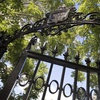{shortcode-338108af37c0b298ded5cbe0a71a9910b0d8e078}
{shortcode-69a9ed06c887cb075e6988b5c6d61980cc21c96c}ost undergraduates will complete their four years at Harvard without ever directly interfacing with the Harvard Undergraduate Association, the College’s student government — except when the HUA disburses funding to student organizations.
Student leaders of Harvard’s more than 400 recognized clubs, which range from affinity groups to the Harvard Undergraduate Beekeepers and the Harvard Undergraduate Psychedelics Club, can apply for funding from the HUA at the start of each semester.
The HUA subsequently divides around half a million dollars — a portion of the Student Activities Fee, an optional annual $200 charge for undergraduates — among these groups, weighing the clubs’ proposed events and additional sources of income.
Student organizations’ funding applications are usually only partially fulfilled. This spring, the HUA allocated only a fraction of more than $1,000,000 in requested club funding.
{shortcode-63cdb2ccdd5dcb9d9dc05b9d0f50b8cdbb7e5903}
Recent years have seen a growing deficit due to an increase in SAF opt-outs. Still, new HUA Co-Presidents Abdullah Shahid Sial ’27 and Caleb N. Thompson ’27 said students can expect increases in club grants at the HUA co-presidential debate earlier this month.
“I think that not enough funding is going out,” Thompson said of club funding allocation. “Although there was a lot of funding this year, we need to increase it, because only 50 percent of the need is currently being met.”
But as the SAF fund continues to dry up each year, the HUA may be forced to think creatively about their current financial model. The body’s new co-presidents said they’re the people for the job.
“The student body, residents, and organization at Harvard is not functioning too well, and it’s evidenced by the fact we’ve had the same things that have been emphasized in the last five campaign cycles by our candidates, and they’re not being done,” Thompson said.
“The reason why we’ve come is because we think there’s a lot of room for change,” Sial added.
The Club Cash Flow
Under former Co-Presidents Ashley C. Adirika ’26 and Jonathan Haileselassie ’26, the HUA voted to allocate roughly $468,000 — 85 percent of its overall budget — to fund student organizations, the largest proportion ever set aside by the body.
“We as administration have been really fighting to give as much as possible to clubs here on campus as possible, because we really think that clubs make this campus life alive,” said Elbs, a former co-treasurer.
When reviewing club funding requests, Elbs and Sood said they eliminated any proposed budget lines that did not align with the HUA’s finance guidelines, which prohibit reimbursement of alcohol purchases and cap venue reservations at $200 per event.
This semester, the total amount of eligible requests totaled to $570,000, despite the HUA only having around $260,000 to give, but Elbs and Sood said no clubs with eligible requests were shut out entirely.
“As long as you do the application, we guarantee that you get some money, just to be equitable. Because, as the HUA, we’re not necessarily the arbiters of picking one student organization over another,” Sood said.
“We think they’re all equally important to campus life,” he added.
How the final decisions are made then falls to an “algorithmic cut” across the board, which Elbs and Sood said aims to keep things as equitable as possible.
Elbs and Sood, however, recently introduced more manual steps into the process, looking at factors such as the quality of the application in order to discourage club leaders from over-requesting funds.
“There is this rumor going on that as long as you just request $20,000, you’re gonna be better off in this funding system, receiving more money, compared to a club who is being maybe more realistic and saying ‘Okay, we want $4,000’,” Elbs said.
“We’ve been cutting more down by hand manually, based on what we think were well-written applications and less leaving it all to the computer,” he added.
{shortcode-468e796abac4c44e46154f2e13b5a8096c9a8cdc}
This spring, the Harvard Society of Arab Students received the largest amount of HUA funding, at $3,243. Additionally, the HUA constitution stipulates that the Phillips Brooks House Association, which contains more than 70 organizations, must receive a fixed $35,000 of funding per year.
As an accountability measure, all clubs are required to submit receipts for expenses funded by the HUA and return any unspent funding at the semester’s end.
The Leftovers
After the HUA distributes club funding, nine of its internal teams use the remaining 15 percent of the budget of around $81,000 to fund the association’s projects and operations.
Some of the top-line expenses include $10,000 to support two upcoming senior class events, a gala and Altitude Trampoline Park outing, and $9,000 to fund the HUA’s inaugural Celebration of Impact set to take place next week.
In February, the HUA’s executive team also spent approximately $4,000 on an AirBnB, Coach bus, and food for an off-campus retreat to New Hampshire, of which $2,200 in funding was reimbursed by the Dean of Students Office.
{shortcode-f257148218aec722b8931ee44dcb5e18de4aa993}
The HUA has not held an off-campus retreat for at least the last two administrations, though the Harvard Undergraduate Council — which preceded the HUA before it was dissolved in a 2022 election — held internal retreats, according to a Harvard Risk Management & Audit Services audit of the body.
Sial and Thompson have not yet determined how much of their budget they will spend on club funding — but they inherit an HUA already spreading its resources thin.
For the 2024-25 academic year, the HUA received $522,500 in total funding from the SAF fund, which is the required source of funding for Harvard’s student organizations in order to ensure the groups can maintain operational independence from the College.
Low numbers of SAF payments meant that this year, the DSO “nickled and dimed” its budget to provide an additional $43,000 to keep the SAF fund stable. Administrators maintained that the funding would not jeopardize the clubs’ independence, specifying that the additional funds would be for “baseline charges.”
In a recent interview, Sial and Thompson acknowledged the decrease in SAF funds and proposed establishing channels for alumni donations to supplement club funding. Thompson said Assistant Dean of Student Engagement and Leadership Andy Donahue “seemed quite optimistic about the potential” for the idea.
{shortcode-332d66a103658f0c54655c8b80e3fad647267e7a}
“We understand that the new HUA officers are exploring alternative sources of funding to support student clubs and organizations, including alumni engagement,” College spokesperson Jonathan Palumbo wrote in a Thursday statement. “The HUA, like other recognized student organizations, does have the ability to fundraise.”
Checks and Balances
Ensuring the proper allocation of the HUA’s funds is not a task left solely in the hands of the two co-presidents and a few officers. The body is required to report all of the funds allocated throughout the year to the University’s Risk Management & Audit Services, which assesses the transactions.
“There are some guidelines that go with our finance guidelines and also with the SAF conditions that we are bound to as the HUA, and which also have been reviewed with the risk management department throughout the past year,” Elbs said.
According to Elbs, this past term, the HUA underwent its first “regular tri-annual audit.”
“It was a good audit. It was a very good cooperative assessment of what is going on with the internal expenditures,” he said. “We performed much better than the UC did,”
Adirika, Haileselassie, and Palumbo all declined to comment on the results of the audit and whether the HUA plans to publicly release them.
The UC was openly condemned by students for its poor financial management and delayed disbursement of Wintersession funds.
On April 11, 2022, following the dissolution of the UC, the Office of Risk Management & Audit Services released an audit of the organization requested by the DSO and former UC president Michael Y. Cheng ’22.
{shortcode-0c129b0fb1246d7e0e11610303bba425a387d395}
The audit concluded that internal financial control at the UC was “inadequate,” stating that “key financial and operating control weaknesses were identified that increase the risk of errors or spending that is not in accordance with the UC’s mission.”
The assessment revealed that the UC lacked financial control over cash expenditures, financial reporting, and budget tracking.
The audit also provided several recommendations to improve financial management under the HUA. These recommendations included the formation of a co-treasurer role, the establishment of rollover funds at the end of each academic year, consultation with and approval from the DSO before fundraising campaigns, and the review of receipts collected from student organizations — all measures that have since been implemented.
—Staff writer Nina A. Ejindu can be reached at nina.ejindu@thecrimson.com. Follow her on X @nina_ejindu.
—Staff writer Claire L. Simon can be reached at claire.simon@thecrimson.com. Follow her on X @ClaireSimon.












